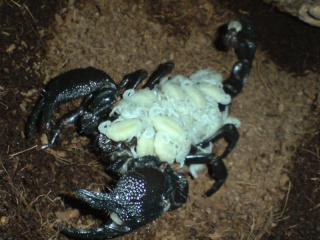First a little background: Had My P. Imp for over 1 year and her other cage mates had died off months ago 1 due to moult the other I found dead. So she'd been alone for a while.
Home and conditions: Kept in a Kritter Keeper with coco soil substate and a large cork hide. Up to that point I was misting to keep it moist, but due to me being hardly there the substrate was dry the majority of the time. (note: heat mat kept underneath only sorce of heat)
August moved her to new flat changed subsrate and increased volume of it kept it very moist by pouring in water.
Noticed she was getting very fat though not feeding her any more than usuall (two/three large hoppers per week). Due to being a beginner I looked online to find ouut that P. Imps can keep thier young for up to 18mths untill conditions are right before giving birth.
P. Imp now getting restless and dug the biggest burrow since i've had her all the way to the plastic of the kritter keeper excavating almost all the substrate from under her cork bark hide. Still eating each week.
September 25: Checking in on her and she is giving birth found one scorpling on her back and a handfull underneath her.
 September 26:
September 26: Checked back the next morning and she has over 27 on her back.
 October 1:
October 1: Humidity not high enough tried cling wrap on the lid but lid not secure enough so stick sticky viynl on inside of kriter keeper lid to block holes and still pouring in water. Scorplings still on mothers back. Fed her two large hoppers and she ate them both.
October 2: One scorpling found dead with predatory mites on it. Realised the are 29-30 scorplings.
October 4: Scorplings still dying. Removed heatmat from underneath and replaced it with a much smaller one as I think they are being cooked. They have started to molt into 2i now, and leaving mothers back.

11 dead in total, 18 left. Still with mother. So including 1st one that died there were 30.

Mother tearing headless hoppers and feeding young.
October 11: Rehoused 2i's into their own large glass tank 14 2i's in total. Lost over half the brood. But these seem healthy and are browning up.




